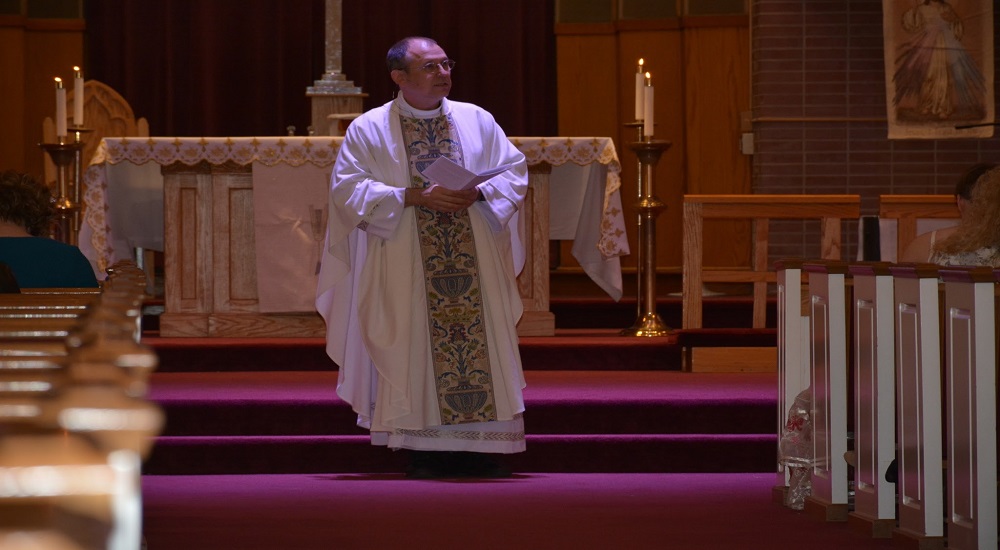Blue Christmas Service
Excerpts from a sermon by Chaplain Jonathan Landon, Eugene VA Health Care Center.
I’ve known for a long time that some men and women really don’t enjoy the holiday season. In recent years I’ve had encounters that really brought home to me how many people there are in this situation, and how deep is their pain.
I’ve been convicted that we – the VA – and we – the community of faith – really should find some way to address this deep, aching need that some of our brothers and sisters feel.
Planning this service brought home to me many reasons why people might suffer during the holidays.
–The first one that comes to mind is grief –loss of a loved one or a friend – but it’s not the only reason.
–Alienation from family or even geographic distance from them can do it.
–Painful memories of events that happened in the holiday season might be a reason.
–Some people are experiencing loss of a job or other economic difficulty.
–Even good things might make the holidays difficult; think about retirement, empty nest, or moving to a new home.
Any big change that affects a strong part of your self-identity might cause loneliness and feelings of isolation.
Even the loss of what might have been can be so painful.
I’m supposed to say something helpful, here, but I don’t want to offer quick fixes or simple tips; What brings healing is going to be distinctive for each person. Still, there are some principles that can help many.
We may suppress our painful feelings, because we don’t want to burden others, but giving ourselves freedom to acknowledge the pain may be helpful by itself. Concealing those feelings can leave us feeling lonelier, and leaves those who care about us helpless to comfort us. So if you need to cry, then cry. And if you need to be hugged, say that, and let your family members and friends reach out to you and meet your need.
I can’t be so presumptuous as to guarantee it, but if you acknowledge your pain, and people offer space to let it out, and make that giving of mutual support into a time for bonding, maybe you can let the pressure off a little bit. Maybe you can relieve the tension of those who care about you, who are trying to avoid stirring up painful feelings. Then you may just find that there’s some room for laughter, smiles, and enjoyment.
You see, what most of us really need is not the quick fix or the simple solution; it’s caring relationships. One of the key themes of the time leading up to Christmas is the prophecy that foretold the coming of Jesus, giving him the name or title of “Emmanuel”, which means, “God with us.” This Word teaches me that I am never alone in any loss or pain, no matter what my emotions may tell me.
But the message is not only about God being with us; we have the opportunity to show the presence of God to others, by living God’s love in truth and caring for them. Some people came here today because they’re struggling with the holidays. Some people came here because they care about who is struggling with the holidays. Some care because of their faith. Some of them just care because they see a human in pain and they don’t want anyone to suffer alone.
Don’t forget: in the midst of your own pain, you have opportunities to come alongside of others – to be with them, as God is with us.
In this fairly recent tradition, the Blue Christmas service usually happens on or close to the 21st of December, the night of the winter solstice, the longest and darkest night of the year.
It’s an appropriate symbol for a time when many people feel alone, lost and in pain. But that’s not the only meaning of the night of the 21st. Because what happens at sunrise on the morning of the 22nd?
The days begin to get longer. At first, it’s by tiny increments and you hardly notice it, and then it grows faster and faster and you can’t miss it. It’s inevitable. The light returns. That, too is part of the symbolism of this night and this service. The light returns. No matter how long the night will be – or has been – the light returns.
Chaplain Jonathan Landon is the chaplain at the Eugene VA Health Care Center.
Topics in this story
More Stories
Veteran Byron Potier weighed almost 300 pounds and was tired and lethargic. He was the perfect candidate for gastric sleeve surgery.
How much do you know about VA care, benefits and services? Don’t miss out on what you've earned—check out the "2025 VA Federal Benefits Guide for Veterans, Dependents, Survivors, and Caregivers" handbook to learn more.
Feeling stressed? Your breath can help you relax and focus. Take 3 minutes to reset and prioritize your well being for this week's #LiveWholeHealth practice.







